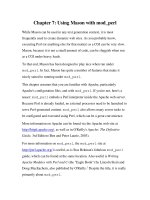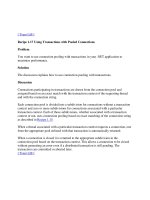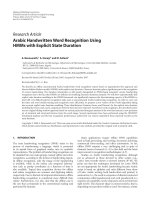Using semicolon with transitional adverbs
Bạn đang xem bản rút gọn của tài liệu. Xem và tải ngay bản đầy đủ của tài liệu tại đây (8.35 KB, 1 trang )
Using semicolon with transitional adverbs
A transitional adverb (e.g. however, therefore, consequently, nevertheless) usually starts a new sentence.
However, sometimes writers separate the two clauses with a semicolon to enable a smoother transition.
He had lost his appetite and was steadily losing weight. Therefore, he decided to consult a doctor.
Here the sentence beginning with the transitional adverb is separated from the previous sentence with a full stop.
A semicolon is also possible here.
He had lost his appetite and was steadily losing weight; therefore, he decided to consult a doctor.
Note that a comma cannot be used here. However, a comma is used to separate the transitional adverb from the
rest of the sentence.
When to use a semicolon
A transitional adverb always begins a new sentence. However, a full stop does not afford a smooth transition from
one sentence to the next. If you feel that the ideas shown by the two clauses are closely connected, you can use
a semicolon instead of a full stop. The choice is yours.
Note that the clause following a semicolon begins with a small letter.
He missed his train; as a result, he was late for the meeting.
I missed my flight; however, I still managed to arrive on time.
He does not hate cricket; on the contrary, he quite likes it.
The security guards were not trained in fire-fighting; therefore, we called the fire force.
It was extremely foggy; nevertheless, they decided to play the game.
Note that it is wrong to connect the two clauses with a comma. This is a very common mistake.
The transitional adverb, however, is very often used like this.
I was not feeling well. However, I decided to attend the meeting.
OR
I was not feeling well; however, I decided to attend the meeting.
BUT NOT I was not feeling well, however, I decided to attend the meeting.
Stay on top of your writing! Download our grammar guide from www.englishgrammar.org to stay up-to-date.
Powered by TCPDF (www.tcpdf.org)









